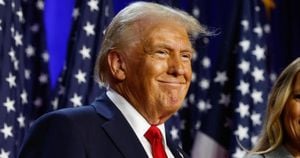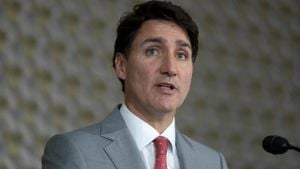Two U.S. Senators have sparked significant discussions by calling for an investigation related to Elon Musk's alleged communications with Russian officials, including President Vladimir Putin. Senator Jeanne Shaheen from New Hampshire and Senator Jack Reed of Rhode Island raised their concerns on November 18, 2024, urging Attorney General Merrick Garland and top military officials to look closely at these interactions, citing potential national security threats.
The backdrop of this inquiry is particularly alarming, as Musk's company SpaceX plays a pivotal role as a government contractor, chiefly supporting NASA and the Pentagon. The senators' letter points to multiple reports indicating discussion between Musk and high-ranking Russian figures has been occurring since as early as 2022. These interactions, if substantiated, could pose serious questions around Musk's security clearance and the interests of the U.S. government.
According to the Wall Street Journal, Musk engaged in high-level dialogues not just with Putin but also with the Russian President's Deputy Chief of Staff, Sergei Kiriyenko. Kiriyenko’s involvement is troubling, especially considering he has faced charges from the U.S. Justice Department this year for orchestrated propaganda efforts via Musk’s social media platform X. This propaganda campaign purportedly sought to manipulate opinions during the upcoming U.S. presidential election.
Concerns surrounding Musk's ties to Russia aren’t new. Political scientist Ian Bremmer has previously reported Musk’s claims of discussions with Putin, particularly focused on the delicate issues related to the Ukraine conflict and Russia’s nuclear capabilities. Interestingly, Musk denied these claims, asserting his conversations with Putin were limited to discussions about space over 18 months ago.
The flow of information and potential influence stemming from Russia raises alarms, especially considering the political environment marked by straining U.S.-Russia relations since the invasion of Ukraine. Amid this geopolitical uncertainty, Shaheen and Reed have emphasized how these relationships, particularly for someone like Musk who benefits from billions of dollars of U.S. taxpayer dollars, could jeopardize national interests.
The senators articulated their apprehensions clearly: “Communications between Russian government officials and any individual with a security clearance have the potential to put our security at risk.” Given Musk’s security clearance, which allows him access to classified information, there are growing worries about the kinds of sensitive information he might inadvertently disclose through these alleged interactions.
SpaceX's standing as the world’s largest satellite operator, coupled with its dependency on military communications for operations, renders Musk’s links with Russia especially concerning. A major player with approximately 7,000 satellites providing vast internet coverage, SpaceX has not only revolutionized satellite communications but has also become integral for operations such as Ukraine’s military connectivity.
Meanwhile, the senators also pointed to the need for increased competition within the satellite and launch industry, spotlighting potential monopolistic tendencies as SpaceX’s influence expands. The discussion about monopolistic practices holds weight as many rely on Musk's technologies, especially when geopolitical tensions influence operational stability.
While the Pentagon and Justice Department have yet to respond directly to the request for investigation, this inquiry has garnered attention from across the halls of Congress. Both Shaheen and Reed, having penned separate letters to military officials, underscored the urgency and importance of conducting thorough reviews of Musk’s affiliations and actions.
Despite the gravity of these claims, the senators face challenges with political dynamics as Musk has significant influence within the current U.S. administration. After reportedly contributing over $119 million to President Trump’s reelection campaign and assuming prominent advisory roles, Musk’s sway complicates how and if investigations might proceed. With Trump’s anticipated return to the White House, Musk’s political clout raises eyebrows about possible conflicts of interest surrounding federal inquiries.
This situation encapsulates the intersection of technology, politics, and national security. With Musk's ventures currently intersecting with military contracts and international geopolitics, scrutiny on his communications with foreign officials may remain at the forefront of dialogue around U.S. national security for quite some time. Both the public and the lawmakers are closely watching how this investigation could play out, particularly as it revolves around one of the most high-profile figures of our era.
The urgency for investigation demonstrates the increasing recognition of how intertwined technology and national security can be. Politicians are grappling with issues surrounding foreign influence, particularly as the pace of technological advancements continues to race forward. To keep America safe, the decisions and relationships forged by high-profile individuals like Elon Musk cannot exist without scrutiny.



